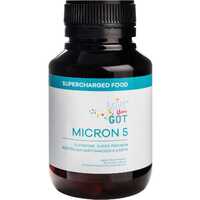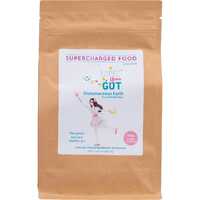Gut diversity and balance play an important role in our health and wellbeing. While everyone wants to look great on the outside, how our bodies function on the inside has a much bigger effect on our energy levels, mental health, and ability to fight disease. What happens deep inside the gut often mirrors our overall health condition, so it's important to eat the right foods and make the right moves to keep our gut in tip-top shape.
From the moment we take our first breath, our health status is influenced by the extent and diversity of microbes living inside our bodies. While there is a heritable component to gut microbiota, there's a lot we can do to influence this environment. The importance of 100 trillion microorganisms living in our gastrointestinal tract cannot be denied. From millions of bacteria to various viruses, fungi and protozoa, the ability to manage internal balance on a micro-scale is an important part of promoting and maintaining good health.
What is the Gut Microbiome?
A normal healthy human gut comprises of two major phyla, Bacteroidetes and Firmicutes. In addition, smaller numbers of Actinobacteria, Proteobacteria, Fusobacteria, and Verrucomicrobia are also represented. Overall, no more than 160 species make up human gut bacteria, with 90% of all species represented in the two dominant phyla. While Bacteroidetes consist mostly of Bacteroides and Prevotella, the Firmicutes phylum is composed of over 200 different genera. These microbes function almost like an organ and weigh slightly more than our brains.
Growing awareness of the importance of gut health highlights a significant shift in how we understand human health. While microorganisms are often viewed as pathogens by the immune system, the vast majority of bacteria and other microorganisms in the gut are non-pathogenic and symbiotic with the surrounding environment. Instead of trying to eliminate everything that can be identified as "other," nutritionists and medical professionals are learning about the importance of gut richness and diversity, both of which contribute to the concept of gut balance.
When is the Gut Microbiome Developed?
The gut microbiome springs into action immediately, from the long journey down the birth canal to the first lung-opening cry and nourishing feed. As we get older, eat foods, and interact with the environment, the balance of microorganisms in the gut changes and affects every aspect of our life. By the age of three, a child's gut bacteria mostly resembles that of an adult. Not only does this rich and complex biome help us to digest foods and turn fuel into energy, but it also helps to train and control our immune system functions and influence our ability to fight disease.
The Role of the Gut Microbiome
The gut microbiome enables the fermentation of non-digestible substrates in the body, including dietary fibres and intestinal mucus. This fermentation process supports the growth of specialist microbes, including acetate, propionate, and butyrate. These short-chain fatty acids (SCFAs) have an important role to play in human health. They provide energy for important cellular functions, maintain correct oxygen balance, and enable metabolism and appetite regulation, among other functions. Due to the connected and low-level nature of these interactions, gut health has an influence on all aspects of human health and wellbeing.
Unhealthy gut microbiota has been associated with a number of human diseases, ranging from mild complications to life-threatening conditions. These diseases include inflammatory bowel diseases such as irritable bowel syndrome, allergic diseases, neurodevelopmental illnesses, and metabolic diseases such as obesity and diabetes. Along with helping to prevent specific diseases, a healthy gut also contributes to a range of biological functions. Everything from brain function and metabolism to mental health and energy regulation is affected in some way by our gut.
Unhealthy gut conditions can lead to leaky gut syndrome, which is a type of low-grade inflammation thought to cause a range of bowel problems, allergies, and autoimmune diseases, along with mood problems and obesity. Also known as a permeable gut, a leaky gut allows foreign substances to enter the blood, which causes an autoimmune response due to a breakdown in the complex bidirectional relationship between immune system function and gut health.
How to Influence Gut Health
Like all healthy ecosystems, the richness and integrity of our microbiome are almost entirely dependent on balance. We can greatly influence this balance through diet, exercise, and stress reduction techniques, among other strategies. While there is a heritable component to gut microbiota, environmental factors play a more significant role in microbiota composition. Along with diet and exercise, drug intake can also have a huge effect on the gut, along with anthropometric measures related to diet and exercise such as muscle, bone, and adipose tissue composition.
Gut Health and Diet
We are what we eat. Our dietary intake affects every aspect of our gut health and general wellbeing. Eating lots of natural and unprocessed foods is critical if you want to promote healthy gut flora. These include cruciferous vegetables and foods high in antioxidants like blueberries, flaxseed oil, garlic, and ginger. A high-fibre intake can help to restore healthy gut flora, with seasonal fresh fruits and vegetables, healthy fats, and fermented foods also known to improve gut health in combination with a balanced diet.
The diversification of your diet is one of the best ways to improve your gut diversity, so try out new recipes and take advantage of fresh seasonal foods. The Hadza people of Tanzania have better gut diversity than most. The average Hadza person consumes close to 600 different plant and animal species throughout the year with significant seasonal variation. Some popular restrictive diets may have a negative effect on gut health, including certain strict vegan diets, strict raw food diets, and gluten-free diets.
Gut Health and Exercise
How you move upon the Earth also has a role to play in your gut health. While the influence of exercise is not as direct as diet, fitness regimes have a profound influence on how we use our fuel intake. Like many natural processes, how our guts regulate bodily functions involves a feedback process between input and output. Exercise gives us strength and stamina so we can use fuel more efficiently. When combined with a healthy diet, exercise helps to promote better biological control mechanisms related to metabolism and appetite regulation.
Medication and Hygiene
In addition to diet and exercise, medication has a key role to play in gut microbiota composition. For example, while they are undeniably useful at times, antibiotics can wreak havoc on the health of your gut. Antibiotics destroy both good and bad microbes as they don't have the ability to discern the difference. Even common medications like paracetamol and antacids can interfere with beneficial microbes in your gut, so pay close attention to your medication intake at all times. While cleanliness is undeniably important, the overuse of antibacterial sprays can also harm gut health by creating fewer opportunities for exposure to beneficial bacteria.
Stress and Mental Health
Sometimes called the "silent killer," stress is known to wreak havoc on the body and mind. Physical stress often leads to inflammation and injury, and psychological stress has been associated with a greater risk for depression, heart disease, and many infectious diseases. Avoiding long-term psychological stress is one of the best things you can do for your gut health and general wellbeing. Effective ways to manage stress include mindfulness strategies, meditation, and relaxation techniques. While these techniques will do little by themselves, they can be highly beneficial in combination with a healthy diet and exercise plan.
The richness and diversity of the gut microbiome are increasingly recognised as important parts of human health and wellbeing. The microorganisms living inside our gut are numerous and incredibly influential, with every part of our body and mind affected by the balance and integrity of this micro-scale environment. There's a lot you can do to promote a healthy gut, including great food, regular exercise, and a balanced frame of mind that recognises the importance of the little things.


 Certified Organic
Certified Organic Vegan Friendly
Vegan Friendly  Vegetarian
Vegetarian Organic Ingredients
Organic Ingredients Dairy Free
Dairy Free Gluten Free
Gluten Free Keto Friendly
Keto Friendly
































